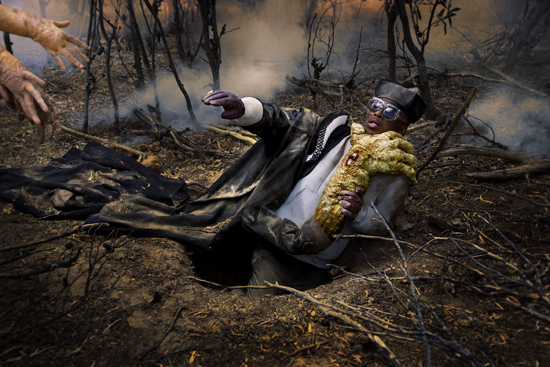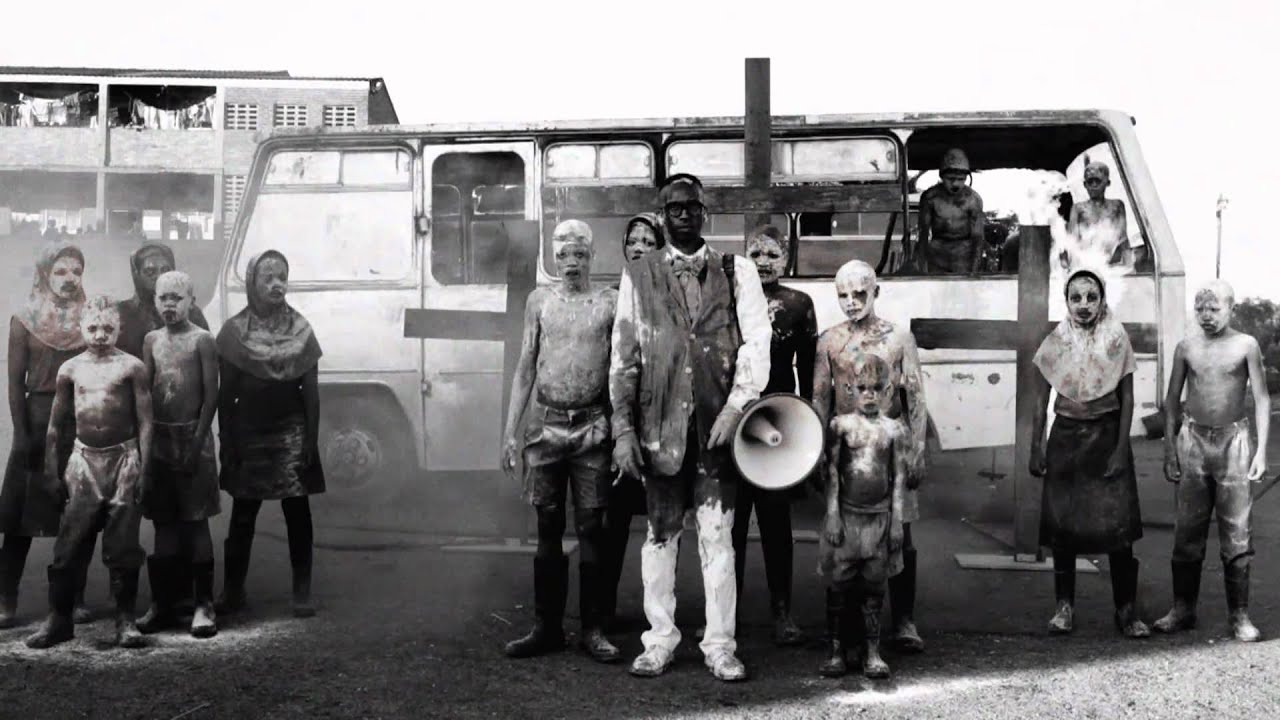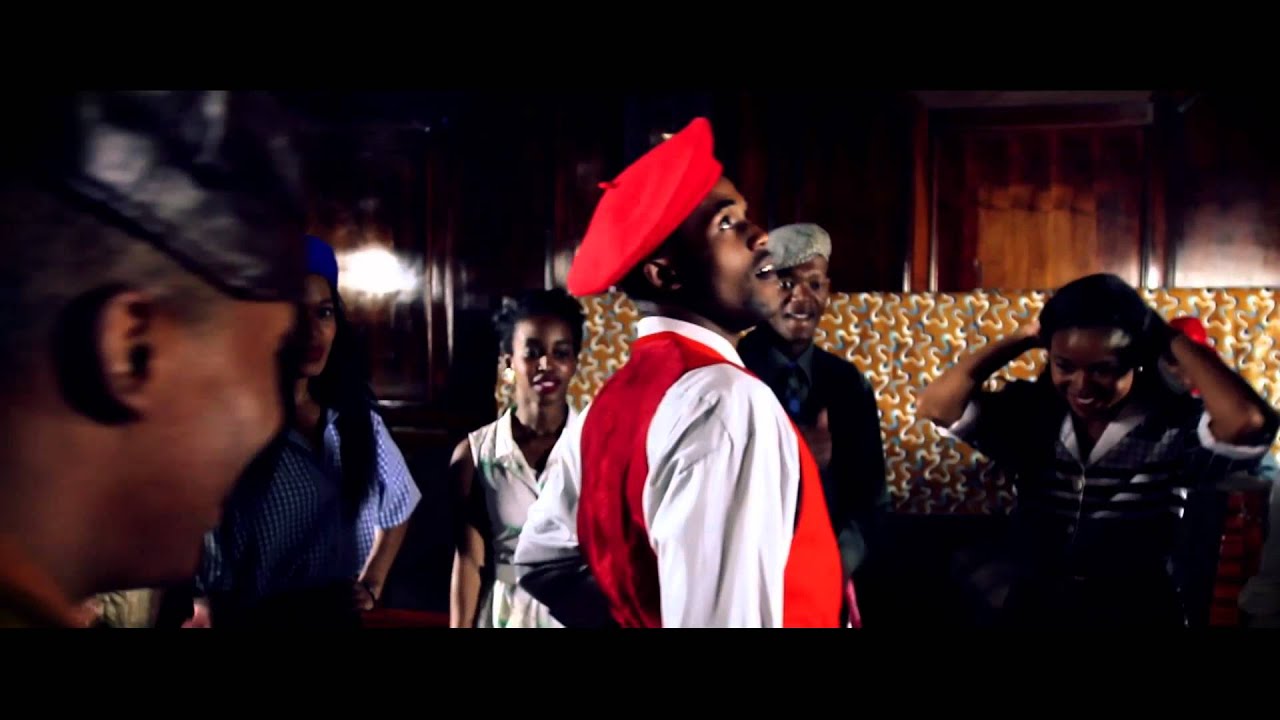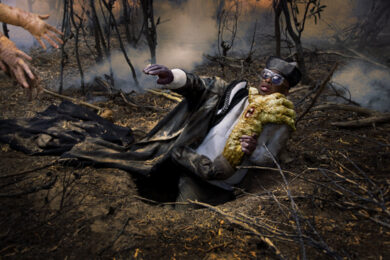With the Olympics (literally) around the corner, The Quietus are no strangers to some of the more predictable links between major sporting events and music. But while the trotting out of the nation’s fondest sons – The Specials, New Order and Blur – at this year’s closing ceremony will doubtless stir little passion for new British music in the rest of the world, more could be said for the impact sports have played in bringing South African sounds to a wider audience.
I’m not talking vuvuzelas here. It was ‘Township Funk’ by DJ Mujava, an electronic producer who’d previously distributed his music by way of his local taxi service, that became the unofficial soundtrack for the World Cup in 2010. Since then, South African music has been enjoying a revived global interest not seen since the days of Paul Simon and Ladysmith Black Mambazo. This time, however, the dated ‘world music’ tag and the inherent traditionalism therein do not apply.
Post-apartheid musical factions are often as complicated as the social politics surrounding the country, with stylistic preferences ranging wildly throughout South Africa’s nine provinces. The country’s house scene is burgeoning but compartmentalised. Elsewhere, acts such as Die Antwoord mix up many flavours of house, rock and hip-hop with homegrown sounds such as kwaito and shangaan, adding a flourish of South Africa’s famously dark sense of humour. It makes for a peculiar air of celebration and conflict, of partying in the face of danger, a freedom to experiment without frontiers. Riding this wave comes 26-year old Nthato Mogkata (aka Spoek Mathambo) who, after years of recording material and playing shows in his homeland, garnered outside acclaim in 2011 with his Afro-Gothic take on Joy Division’s ‘She’s Lost Control’, accompanied by a hair-raising video on YouTube.
Spoek Mathambo’s largely electronic debut Mshini Wam caught the unlikely ears of a Sub Pop A&R exec who invited Spoek, who currently resides in Malmo, Sweden, to record his second album Father Creeper for the label. Released in March this year, the album not only showcases Spoek’s formidable talents as a rapper, singer and producer, but also as a key promoter of new South African music. Surrounding himself with collaborators, from old school friends to new acquaintances from further afield, Spoek’s music is at once joyful but discomfiting, a juxtaposing meltdown of styles that transcend even his own self-prescribed label of ‘Township-Tech’.
What initially drew you to making music?
Spoek Mathambo: I remember when I was really young, my brother and I would try to transcribe songs that we liked off cassette, just writing and rewinding, rewinding and writing. This was pre lyric sites and we didn’t have records with liner notes, so we’d write our own lyrics and re-perform them. My brother’s about ten years older than me so I would’ve been about five or six-ish. We’d discuss whatever they were saying and we’d get a lot of it wrong. That was the real beginning of it. Then I started rapping when I was nine or ten with my cousin and I’ve been rapping ever since, for a long time. Producing music started on my last album [Mshini Wam]. But I did a lot of stuff, different groups, different collaborations, like with my band Playdoe. I’ve been making music most of my life, I guess.
How is Father Creeper different to Mshini Wam?
SM: Musically, Father Creeper’s a lot wider in perspective. I think the ideas are a lot grander. It was liberating to go from just the computer-based stuff to live arrangements, mixing a lot of it myself with my friend Marvy and toying around on the post-production side. It was really an intricate process, whereas last time we kind of gave off the mixing to a random engineer. On Father Creeper it’s me and Marvy mixing the vast majority of it. Like the song ‘Grave (Intro)’ – that was totally a by-product of that last process. So it’s me, rolling up my sleeves and getting a lot more involved and really putting my back into it. Also with Sub Pop’s support I was able to make bigger ideas happen as opposed to forking it all out of my own pocket and having quite a computerised album because of that.
It does have a more ‘live’ sound, with more guitar and live drums. Is that something you consciously wanted to do when you started making the album?
SM: I’d been touring with my band for about eight months before we got into the studio. We’d been to Argentina, Brazil and Europe and we played a lot of shows in America so all the songs were written on the road. I wanted to make something that wasn’t so trapped in time, like a ‘super-digital’ ‘2010’ album, as opposed to working towards something classic that could have been made thirty years in the future or thirty years ago.
What led you to covering ‘She’s Lost Control’ by Joy Division?
SM: I was doing a covers project in 2008. We did a bunch of South African obscure-ish eighties stuff that I was finding out about and that I really enjoyed. From around the world we did Suicide’s ‘Ghost Rider’, then we did Joy Division’s ‘Control’. The thread running through it all was South African house and South African techno – township-tech, township house, y’know? I kind of found a similar spirit in Suicide’s music and Joy Division’s music as I did in contemporary South African house. You got the same sense of angst and darkness. It describes a place and I found a similar spirit to it. Richard the Third is the guy that worked a lot on that song with me. He’s a producer from Cape Town, a really great prolific producer. I threw a hip-hop party when I was in tenth grade or whatever, and he was producing all the big hip-hop songs in Johannesburg. But this was when hip-hop was really underground, really abstract, murky, smoked-out late-‘90s / early-2000s hip-hop. He and I, from opposite sides, are into rock and all kinds of different branches, so when we came together to work on stuff, Joy Division came along.
It wasn’t about researching what [Ian Curtis] meant with the lyrics. It’s about reading the lyrics and then rewriting a chunk of them and just messing around with them for it to mean something to me. Then Pieter [Hugo] and Michael [Cleary] took it to the next level with the video. Everyone who was involved in that video contributed something different.
There’s a pervading perception of South African music in the West as being quite colourful and upbeat. Your music is upbeat, but it’s often juxtaposed with quite frightening imagery. Is that a common aesthetic found in South African music?
SM: I just try to describe things the way I see them. A lot of stuff, even in the UK, is colourful and bright and poppy because that sells and that’s what you can sell to thirteen year old girls, you know what I mean. I’m not really under any pressure to do that, so I’m interested in a lot of other spaces. I think a lot of the feelings and sensibilities that I touch on are very real and are there. I like that I have my own cultural space that I’m etching out. That’s fun.
You’ve spoken in the past about how you’re influenced by horror movies, Nollywood, certain photographers…
SM: It’s not like I’m interested in horror movies per se. I’m more interested in the fact it’s DIY. I like the interest in creating these horror images with minimal budget. That’s cool. Not having to wait because of funding and ‘oh no the sponsors, the sponsors, the sponsors. There needs to be more sponsors!’. Just having an idea and making it happen – I think that’s where innovation comes from.
I’ve noticed the phrase ‘don’t be scared’ crop up in more than one song. Is that a personal motto?
SM: It means a couple of things. As a South African in South Africa, there are times when you’ll be sitting in your living room and you have to switch on all the alarms in the house and you’re living behind a big electric fence, and you’ve got closed-off communities, security guards with guns, guys with shotguns patrolling the streets, you’ve got guard dogs. I’m not talking about an abstract situation, I’m talking about my parents’ house. You’ll be watching a movie and you don’t know what’s in the yard. There’s a big fear in that sense – not in the sense as with a lot of neighbourhoods where you can’t walk about at night – but it feels like you can’t walk around at night.
The media plays a big role in perpetuating that sense of fear. And then there are foreigners who come to South Africa, hear about South Africa through their media which perpetuates a whole other level of fear, and those people come and have the best time of their lives. There’s also the personal side of it – a fear of whether to do or not to do what you want. On the first album, the song ‘Don’t Be Scared (Gwababa)’ was a rap that Yolanda & Avuyile, the two girls rapping on it, they kind of wrote that song as a girl gang cussing out another gang.
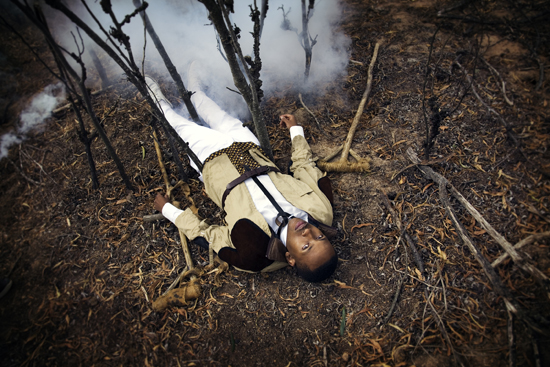
You might be described as, how shall I say, a rather flamboyant artist…
SM: [Laughs] Like Liberace?
‘Flamboyance’ might not be the right term. I probably should’ve said ‘weirdness’… But do you think South Africa generally welcomes this kind of artist?
SM: If you can connect with people you can do anything. Whether it’s a novelty thing is a whole other debate. I don’t think weirdness stops people particularly, but on the other hand it’s a very Christian Conservative society, so certain images do put a lot of people off. Often they can’t put their finger on why they don’t like it, but it scares them. With the ‘Control’ video, that was a big factor, people were like, “that’s scary, I don’t need stuff like that”. But with the new stuff I don’t want, and I don’t need to be, the “Goth artist”, because that’s not just who I am… I don’t always need to be sitting up in a graveyard with flowers and eyeliner and stuff.
So that’s a one off for you?
SM: Or it might be a recurring theme. I’m into subtext, and sometimes to draw people in is to understand what draws them in, and to put whatever else you want in there as well, but not to be bombarding them with stuff that freaks them out. I like to have the teaspoon of sugar with something else in it as well – presenting messages in good, palatable ways. My huge influences are people like Prince and Stevie Wonder, people with a strong melodic sense, a strong rhythmic sense, and their songs are like “Man, this is awesome”, and then you’ll get the lyric. They always had tough lyrics – some socio-political stuff, some party stuff, it’s a good, wide musical basis.
I wanted to talk a bit about dance music in South Africa. With releases like the Ayobaness! compilation from a year or two ago, it seems people in the West are really starting to get into styles that have been going on for a very long time…
SM: It’s a really vital scene and it’s changing every day. So it’s not as though people are picking up on something that has been going on for a long time – the scene keeps growing and people are growing into it. And also the UK having that big rise in its own tribal and funky house movements, a lot of synthy dance stuff with that percussive Latin house/Afro-house vibe, can tap into South African stuff as well.
Are they feeding off each other?
SM: Not so much UK music into South Africa, I don’t know why. I have no explanation for why UK funky isn’t bigger in South Africa because American house, stuff like DJ Gregory is very popular. It’s just because that communication hasn’t happened yet. I’ve spoken to Roska – he’s got a lot of contact in South Africa. Scratcha DVA went to South Africa but his going there was more for the white electro/dubstep side of it, he played at a trance festival so he didn’t really make contact with the house house people, who would be more into stuff like Black Coffee, Tira – the Ayobaness side of it.
I get to see a lot of UK stuff because I’m moving about a lot. South African DJs do come to the UK, but often it’s for the South African population in London – ‘South Africa’ parties, you know? I’d like to see the top people from both scenes playing together. It makes such perfect sense to me because that’s how I DJ. Those collaborations have to happen. There is this one small label called Huntleys and Palmers based in East London who put out a double A-side with Auntie Flo on one side and a South African DJ called Sdunkero. The Sdunkero track, ‘Choosing Love’, is a lot like Bok Bok or LV and a lot of people were into that one track so it got repressed for the UK market.
The guy who put originally put us in touch for the interview sent me some African deep house stuff by a guy called DJ Tsoro, which I really liked…
SM: South Africa’s got its own house politics between what they call commercial house and deep house. Deep house is considered quite sophisticated, loungey, people in suits, and then there’s township house. There are nine regions in South Africa and each region has pretty much its own sound to go with its own vastly different socio-economic standards. Some stuff is thought of as ‘Ugh, that stuff is so ghetto – don’t play that in this club, that guy’s got no taste…’ I’m in a pretty good position because I don’t really care and I can just find tunes and play anything.
There’s been a reported ‘brain drain’ in South Africa with a lot of educated and creative types moving away to Europe and America. Do you think that might happen with music?
SM: ‘Brain drain’? I guess in my time that’s sort of been happening since liberation days, when a lot of people left fearing that the whole country was going to go up in flames. Even before that, a lot of artists were leaving South Africa because the situation was so bad so there was a creative drain. Our first modern art painter, Gerard Sekoto, left to go to Paris around the 1940s, others left in the ‘60s – all the greats kind of left and then came back. Creatively, now, South Africa’s pretty fertile, but I think with the internet you can work from South Africa and exist all around the world. A group like Die Antwoord is huge around the world, and they’re very much based in South Africa. I don’t think they really need to leave because they can always fly out.
There’s been a big whinge factor that the record companies don’t support certain kinds of South African art, while that stuff’s appreciated more overseas than at home. Filmmakers and directors have to do commercial work like advertising in order to pay the rent, otherwise there’s no support. Before there was no real support for fashion, but since then the government’s put millions into it. It’s a very young democracy and it’s excitedly booming forward. I’m excited to be a part of it too. I only just got my first South African record deal now. My music’s never formally been released in South Africa, so it’s kind of like a homecoming.
Spoek Mathambo plays the following UK dates in May:
MAY
10th – Brighton, The Great Escape
12th – Brighton, The Great Escape (Africa Express)
16th – Manchester, Ruby Lounge
17th – London, Hoxton Square Bar & Grill
18th – Edinburgh, Bongo Club

